【专题课件】小升初英语专题精讲 第二十二讲 动词 一般将来时(超全精编版)(共28张PPT)
文档属性
| 名称 | 【专题课件】小升初英语专题精讲 第二十二讲 动词 一般将来时(超全精编版)(共28张PPT) | 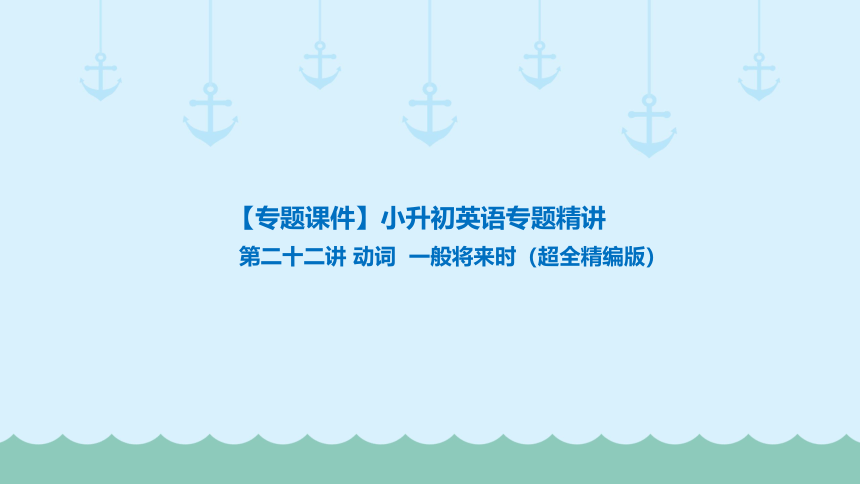 | |
| 格式 | ppt | ||
| 文件大小 | 743.5KB | ||
| 资源类型 | 试卷 | ||
| 版本资源 | 通用版 | ||
| 科目 | 英语 | ||
| 更新时间 | 2020-11-02 18:50:06 | ||
图片预览

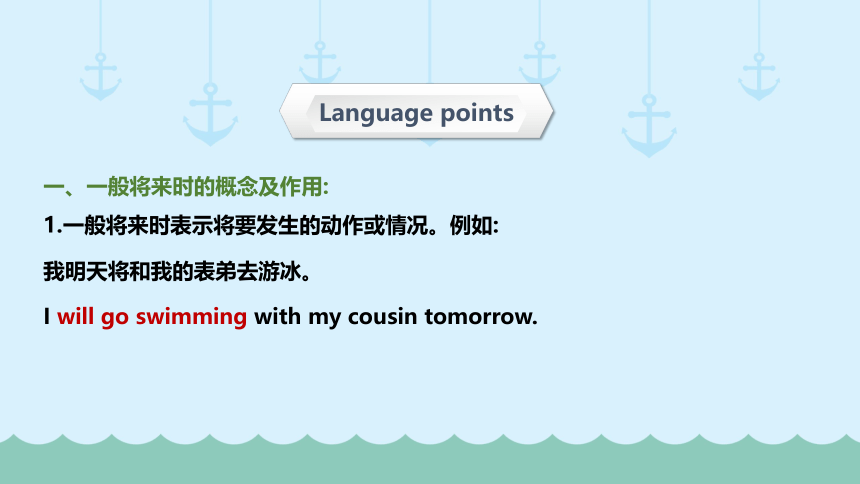
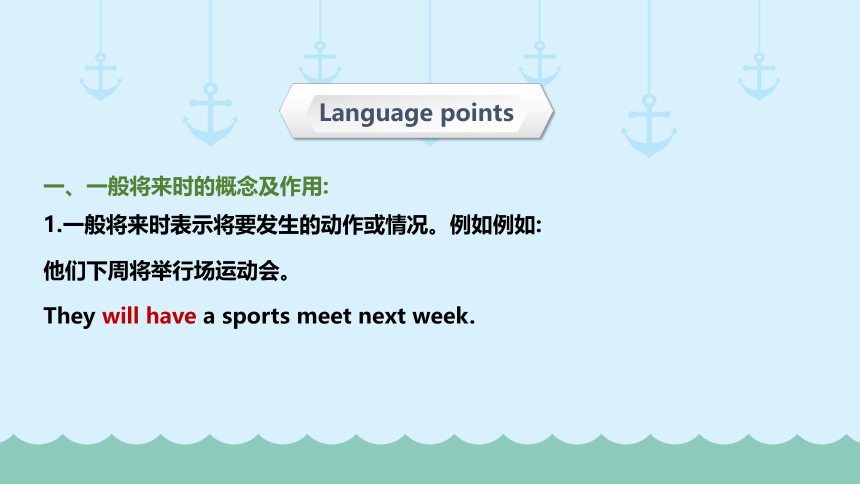
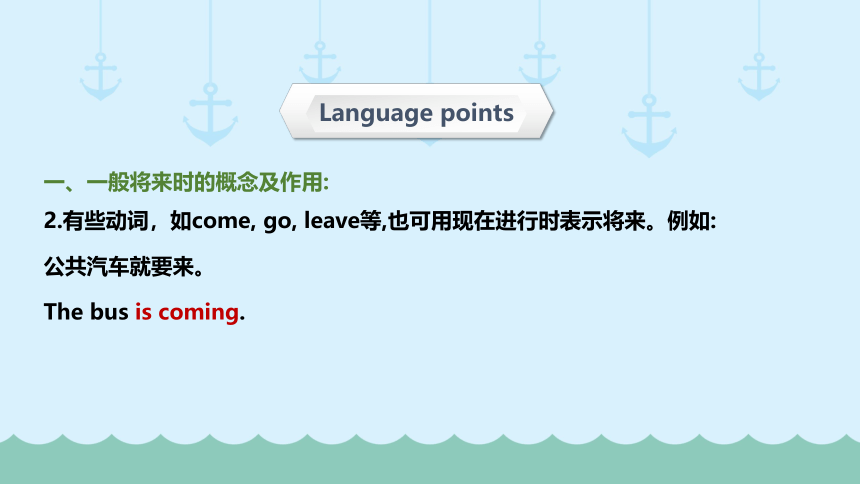
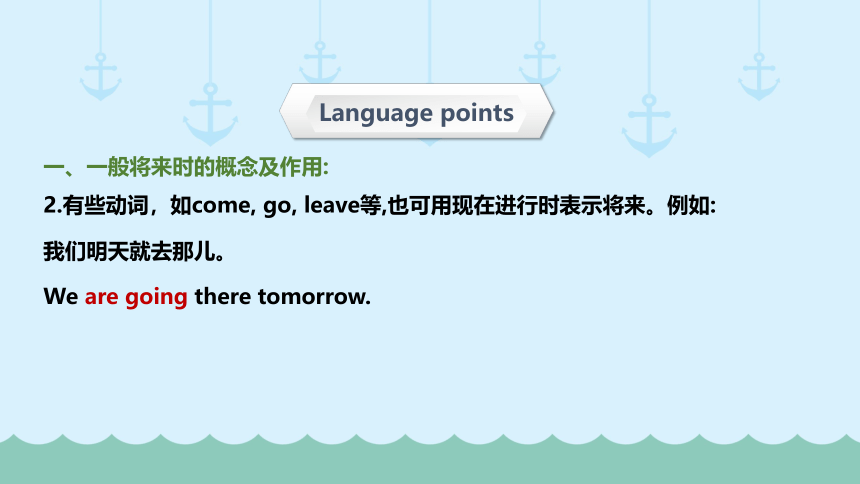
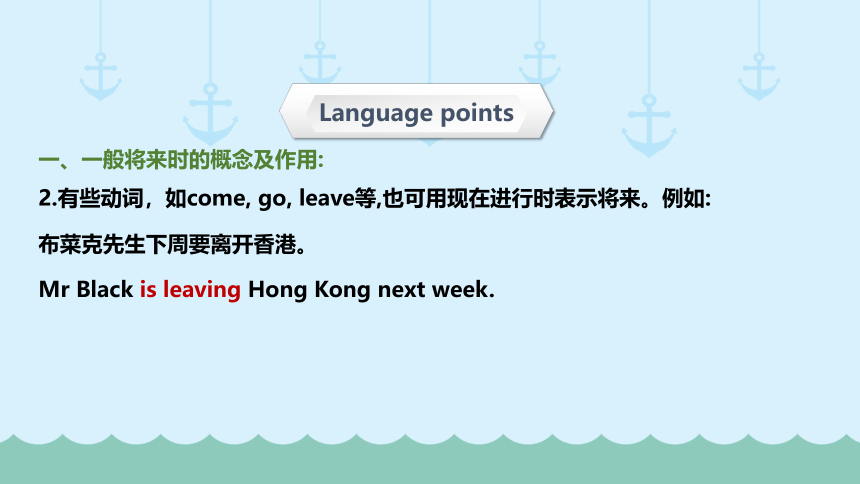
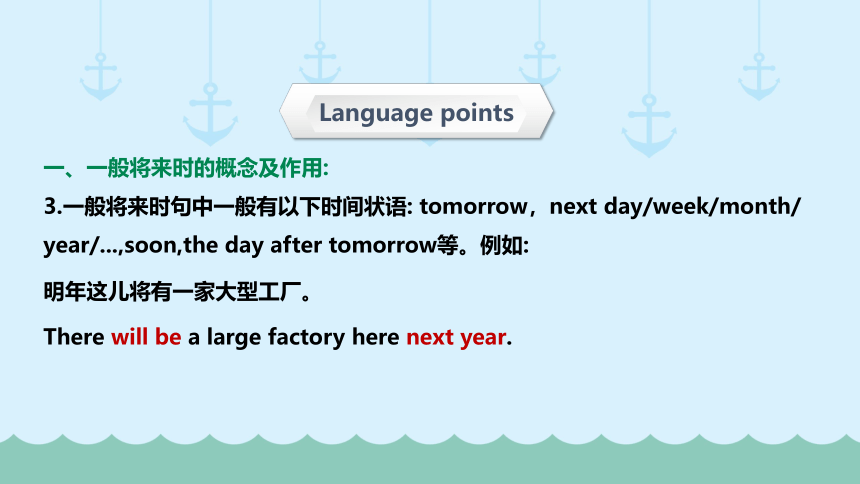

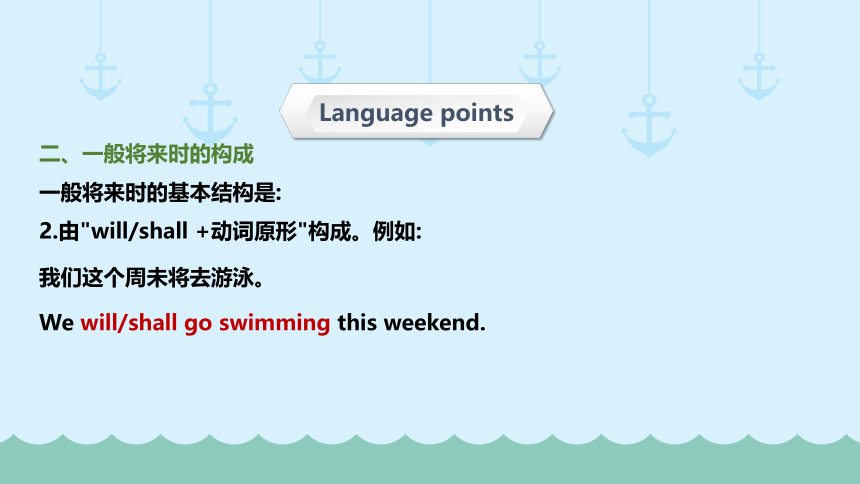
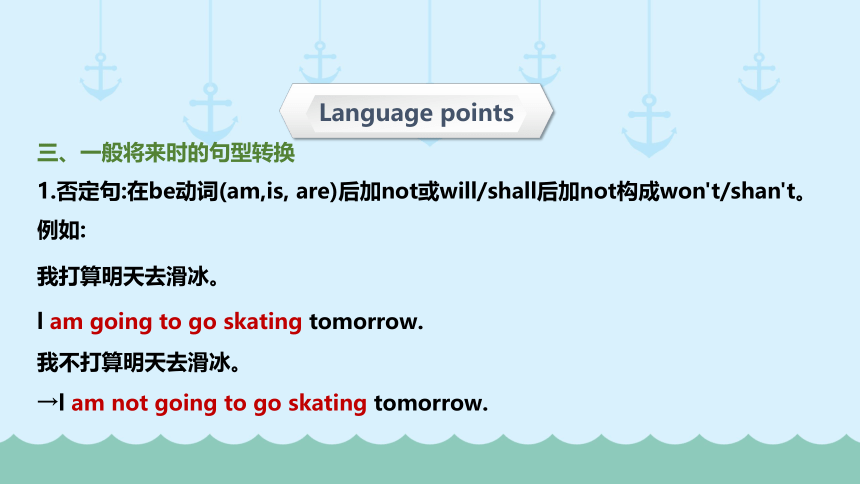
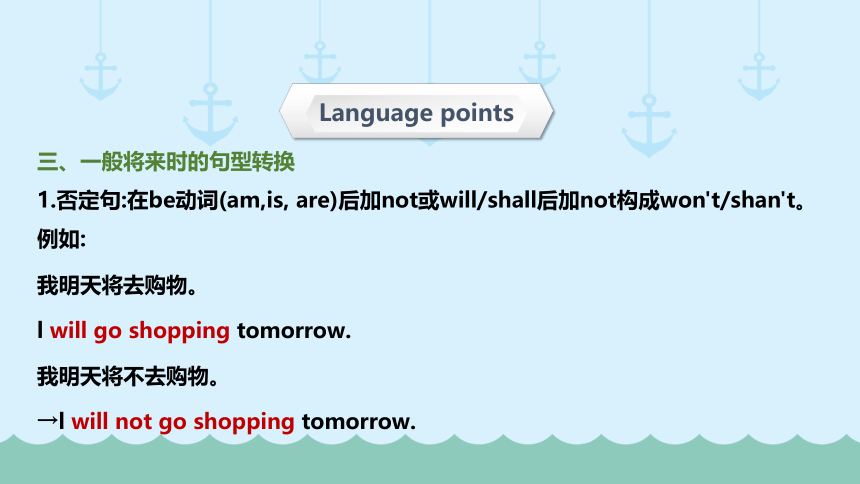

文档简介
【专题课件】小升初英语专题精讲
第二十二讲 动词 一般将来时(超全精编版)
Language points
一、一般将来时的概念及作用:
1.一般将来时表示将要发生的动作或情况。例如:
我明天将和我的表弟去游冰。
I will go swimming with my cousin tomorrow.
Language points
一、一般将来时的概念及作用:
1.一般将来时表示将要发生的动作或情况。例如例如:
他们下周将举行场运动会。
They will have a sports meet next week.
Language points
一、一般将来时的概念及作用:
2.有些动词,如come, go, leave等,也可用现在进行时表示将来。例如:
公共汽车就要来。
The bus is coming.
Language points
一、一般将来时的概念及作用:
2.有些动词,如come, go, leave等,也可用现在进行时表示将来。例如:
我们明天就去那儿。
We are going there tomorrow.
Language points
布菜克先生下周要离开香港。
Mr Black is leaving Hong Kong next week.
一、一般将来时的概念及作用:
2.有些动词,如come, go, leave等,也可用现在进行时表示将来。例如:
Language points
一、一般将来时的概念及作用:
3.一般将来时句中一般有以下时间状语: tomorrow,next day/week/month/
year/...,soon,the day after tomorrow等。例如:
明年这儿将有一家大型工厂。
There will be a large factory here next year.
Language points
二、一般将来时的构成
一般将来时的基本结构是:
1.由"be going to +动词原形"构成。例如:
我打算明天去钓鱼。
I am going to go fishing tomorrow.
Language points
二、一般将来时的构成
一般将来时的基本结构是:
2.由"will/shall +动词原形"构成。例如:
我们这个周未将去游泳。
We will/shall go swimming this weekend.
Language points
三、一般将来时的句型转换
1.否定句:在be动词(am,is, are)后加not或will/shall后加not构成won't/shan't。例如:
我打算明天去滑冰。
l am going to go skating tomorrow.
→l am not going to go skating tomorrow.
我不打算明天去滑冰。
Language points
三、一般将来时的句型转换
1.否定句:在be动词(am,is, are)后加not或will/shall后加not构成won't/shan't。例如:
我明天将去购物。
l will go shopping tomorrow.
我明天将不去购物。
→l will not go shopping tomorrow.
Language points
三、一般将来时的句型转换
2.一般疑问句:将 be动词或will/shall 提到句首,some改为any, and改为or,第一、第二人称互换。例如:
他们打算下周去摘些橙子。
They are going to pick some oranges next week.
他们打算下周去摘些橙子吗?
→Are they going to pick any oranges next week?
Language points
三、一般将来时的句型转换
2.一般疑问句:将 be动词或will/shall 提到句首,some改为any, and改为or,第一、第二人称互换。例如:
我明天将参观颐和园。
I will visit the Summer Palace tomorrow.
你明天将参观颐和园吗?
→Will you visit the Summer Palace tomorrow?
Language points
三、一般将来时的句型转换
3.特殊疑问句:由“疑问词+一般疑问句”构成。例如:
汤姆将去上学。
Tom will go to school.
谁将去上学?
→Who will go to school?
Language points
My father is going to watch a race with me this afernoon.
你父亲打算今天下午和你去干什么?
→What is your father going to do with you this aferoon?
三、一般将来时的句型转换
3.特殊疑问句:由“疑问词+一般疑问句”构成。例如:
我父亲打算今天下午和我去看比赛。
Improve
1. shall用于第一人称,will用于第二、三人称。例如:
我将为聚会买些花。
I shall buy some flowers for the party.
你将和我们一起去吗?
Will you go with us?
shall、will与be going to的用法
Improve
我们看电视好吗?
Shall we watch TV?
我们明天有课吗?
Shall we have any classes tormorrow?
shall、will与be going to的用法
2.在以I或we作主语的问句中,一般用shall,此时表示征求对方的意见或是询问一个情况。例如:
Improve
shall、will与be going to的用法
3. be goingto表示根据主观判断将来肯定发生的事情,will表示客观上将来势必发生的事情。例如:
天要下雨。
It is going to rain.
他们明天将回来。
They will come back tomorrow.
Practice
真题演练:翻译句子。
1. 王兵将要去看望他的叔叔吗?
答案:Will Wang Bing go to visit his uncle?
解析:此句说明将要发生的情况,故用一般将来时来表达。
Practice
真题演练:翻译句子。
2.我们步行去购物中心好吗?
答案:Shall we go to the shopping centre on foot?
解析:此句是表示询对方意见,故用“Shall we ...?“句式来表达。
Practice
真题演练:翻译句子。
3.她打算明天和她的父母起去远足。
答案:She is going to go hiking with her parents tomorrow.
解析:表示打算做某事,用 be going to do的结构表达。
Practice
随堂演练:用所给动词的适当形式填空。
4.一 _________ we ________ (play) football this afternoon?
一Sounds great!
Shall play
解析:句意:-这个下午我们能踢足球么?-听起来很棒!。此句是表示询对方意见,故用“Shall we ...?“句式来表达。
Practice
随堂演练:用所给动词的适当形式填空。
5. ________(be) Liu Tao going to my party?
Is
解析:句意:刘涛打算来我的聚会么?根据句意可知这是一个be doing to do结构的一般将来时的句子,在变成一般疑问句的时候,be动词提前,故答案为Is。
Practice
随堂演练:用所给动词的适当形式填空。
6. My uncle ________________________(come) to see us soon.
is coming/will come
解析:句意:一会我叔叔将要来看我。根据时间状语soon可以判断这道题的时态是一般将来时,一般将来时的构成是主语加be going to /will加do。
Summary
一、一般将来时的概念及作用:
1.一般将来时表示将要发生的动作或情况。
2.有些动词,如come, go, leave等,也可用现在进行时表示将来。
3.一般将来时句中一般有以下时间状语: tomorrow,next day/week/month/
year/...,soon,the day after tomorrow等。
二、一般将来时的构成
1.由"be going to +动词原形"构成。
2.由"will/shall +动词原形"构成。
三、一般将来时的句型转换
Summary
1.否定句:在be动词(am,is, are)后加not或will/shall后加not构成won't/shan't。
2.一般疑问句:将 be动词或will/shall 提到句首,some改为any, and改为or,第一、第二人称互换。
3.特殊疑问句:由“疑问词+一般疑问句”构成。
shall、will与be going to的用法
1. shall用于第一人称,will用于第二、三人称。
2.在以I或we作主语的问句中,一般用shall,此时表示征求对方的意见或是询问一个情况。
3. be goingto表示根据主观判断将来肯定发生的事情,will表示客观上将来势必发生的事情。
Homework
选择填空。
( )1. It is going to __________ tomorrow.
A. rainy B. be rain C. be rainy
( )2.一What are you going to _________?
一We are going to ___________.
A. do; swimming B. be; swim C. do; skate
( )3. It will ______ very cold next Sunday.
A. be B. is C. is going to
C
C
A
Homework
选择填空
( )4. 一Are you going to see a play this Saturday?
一No.I ___________.
A. don't B. am not C. won't
( )5.一 __________ we go swimming tomorrow?
一Good idea!
A. Will B. Shall C. Are
B
B
一、一般将来时的概念及作用:
1.一般将来时表示将要发生的动作或情况。
2.有些动词,如come, go, leave等,也可用现在进行时表示将来。
3.一般将来时句中一般有以下时间状语: tomorrow,next day/week/month/
year/...,soon,the day after tomorrow等。
二、一般将来时的构成
1.由"be going to +动词原形"构成。 2.由"will/shall +动词原形"构成。
三、一般将来时的句型转换
1.否定句:在be动词(am,is, are)后加not或will/shall后加not构成won't/shan't。
2.一般疑问句:将 be动词或will/shall 提到句首,some改为any, and改为or,第一、第二人称互换。
3.特殊疑问句:由“疑问词+一般疑问句”构成。
shall、will与be going to的用法
1. shall用于第一人称,will用于第二、三人称。
2.在以I或we作主语的问句中,一般用shall,此时表示征求对方的意见或是询问一个情况。
3. be goingto表示根据主观判断将来肯定发生的事情,will表示客观上将来势必发生的事情。
第二十二讲 动词 一般将来时(超全精编版)
Language points
一、一般将来时的概念及作用:
1.一般将来时表示将要发生的动作或情况。例如:
我明天将和我的表弟去游冰。
I will go swimming with my cousin tomorrow.
Language points
一、一般将来时的概念及作用:
1.一般将来时表示将要发生的动作或情况。例如例如:
他们下周将举行场运动会。
They will have a sports meet next week.
Language points
一、一般将来时的概念及作用:
2.有些动词,如come, go, leave等,也可用现在进行时表示将来。例如:
公共汽车就要来。
The bus is coming.
Language points
一、一般将来时的概念及作用:
2.有些动词,如come, go, leave等,也可用现在进行时表示将来。例如:
我们明天就去那儿。
We are going there tomorrow.
Language points
布菜克先生下周要离开香港。
Mr Black is leaving Hong Kong next week.
一、一般将来时的概念及作用:
2.有些动词,如come, go, leave等,也可用现在进行时表示将来。例如:
Language points
一、一般将来时的概念及作用:
3.一般将来时句中一般有以下时间状语: tomorrow,next day/week/month/
year/...,soon,the day after tomorrow等。例如:
明年这儿将有一家大型工厂。
There will be a large factory here next year.
Language points
二、一般将来时的构成
一般将来时的基本结构是:
1.由"be going to +动词原形"构成。例如:
我打算明天去钓鱼。
I am going to go fishing tomorrow.
Language points
二、一般将来时的构成
一般将来时的基本结构是:
2.由"will/shall +动词原形"构成。例如:
我们这个周未将去游泳。
We will/shall go swimming this weekend.
Language points
三、一般将来时的句型转换
1.否定句:在be动词(am,is, are)后加not或will/shall后加not构成won't/shan't。例如:
我打算明天去滑冰。
l am going to go skating tomorrow.
→l am not going to go skating tomorrow.
我不打算明天去滑冰。
Language points
三、一般将来时的句型转换
1.否定句:在be动词(am,is, are)后加not或will/shall后加not构成won't/shan't。例如:
我明天将去购物。
l will go shopping tomorrow.
我明天将不去购物。
→l will not go shopping tomorrow.
Language points
三、一般将来时的句型转换
2.一般疑问句:将 be动词或will/shall 提到句首,some改为any, and改为or,第一、第二人称互换。例如:
他们打算下周去摘些橙子。
They are going to pick some oranges next week.
他们打算下周去摘些橙子吗?
→Are they going to pick any oranges next week?
Language points
三、一般将来时的句型转换
2.一般疑问句:将 be动词或will/shall 提到句首,some改为any, and改为or,第一、第二人称互换。例如:
我明天将参观颐和园。
I will visit the Summer Palace tomorrow.
你明天将参观颐和园吗?
→Will you visit the Summer Palace tomorrow?
Language points
三、一般将来时的句型转换
3.特殊疑问句:由“疑问词+一般疑问句”构成。例如:
汤姆将去上学。
Tom will go to school.
谁将去上学?
→Who will go to school?
Language points
My father is going to watch a race with me this afernoon.
你父亲打算今天下午和你去干什么?
→What is your father going to do with you this aferoon?
三、一般将来时的句型转换
3.特殊疑问句:由“疑问词+一般疑问句”构成。例如:
我父亲打算今天下午和我去看比赛。
Improve
1. shall用于第一人称,will用于第二、三人称。例如:
我将为聚会买些花。
I shall buy some flowers for the party.
你将和我们一起去吗?
Will you go with us?
shall、will与be going to的用法
Improve
我们看电视好吗?
Shall we watch TV?
我们明天有课吗?
Shall we have any classes tormorrow?
shall、will与be going to的用法
2.在以I或we作主语的问句中,一般用shall,此时表示征求对方的意见或是询问一个情况。例如:
Improve
shall、will与be going to的用法
3. be goingto表示根据主观判断将来肯定发生的事情,will表示客观上将来势必发生的事情。例如:
天要下雨。
It is going to rain.
他们明天将回来。
They will come back tomorrow.
Practice
真题演练:翻译句子。
1. 王兵将要去看望他的叔叔吗?
答案:Will Wang Bing go to visit his uncle?
解析:此句说明将要发生的情况,故用一般将来时来表达。
Practice
真题演练:翻译句子。
2.我们步行去购物中心好吗?
答案:Shall we go to the shopping centre on foot?
解析:此句是表示询对方意见,故用“Shall we ...?“句式来表达。
Practice
真题演练:翻译句子。
3.她打算明天和她的父母起去远足。
答案:She is going to go hiking with her parents tomorrow.
解析:表示打算做某事,用 be going to do的结构表达。
Practice
随堂演练:用所给动词的适当形式填空。
4.一 _________ we ________ (play) football this afternoon?
一Sounds great!
Shall play
解析:句意:-这个下午我们能踢足球么?-听起来很棒!。此句是表示询对方意见,故用“Shall we ...?“句式来表达。
Practice
随堂演练:用所给动词的适当形式填空。
5. ________(be) Liu Tao going to my party?
Is
解析:句意:刘涛打算来我的聚会么?根据句意可知这是一个be doing to do结构的一般将来时的句子,在变成一般疑问句的时候,be动词提前,故答案为Is。
Practice
随堂演练:用所给动词的适当形式填空。
6. My uncle ________________________(come) to see us soon.
is coming/will come
解析:句意:一会我叔叔将要来看我。根据时间状语soon可以判断这道题的时态是一般将来时,一般将来时的构成是主语加be going to /will加do。
Summary
一、一般将来时的概念及作用:
1.一般将来时表示将要发生的动作或情况。
2.有些动词,如come, go, leave等,也可用现在进行时表示将来。
3.一般将来时句中一般有以下时间状语: tomorrow,next day/week/month/
year/...,soon,the day after tomorrow等。
二、一般将来时的构成
1.由"be going to +动词原形"构成。
2.由"will/shall +动词原形"构成。
三、一般将来时的句型转换
Summary
1.否定句:在be动词(am,is, are)后加not或will/shall后加not构成won't/shan't。
2.一般疑问句:将 be动词或will/shall 提到句首,some改为any, and改为or,第一、第二人称互换。
3.特殊疑问句:由“疑问词+一般疑问句”构成。
shall、will与be going to的用法
1. shall用于第一人称,will用于第二、三人称。
2.在以I或we作主语的问句中,一般用shall,此时表示征求对方的意见或是询问一个情况。
3. be goingto表示根据主观判断将来肯定发生的事情,will表示客观上将来势必发生的事情。
Homework
选择填空。
( )1. It is going to __________ tomorrow.
A. rainy B. be rain C. be rainy
( )2.一What are you going to _________?
一We are going to ___________.
A. do; swimming B. be; swim C. do; skate
( )3. It will ______ very cold next Sunday.
A. be B. is C. is going to
C
C
A
Homework
选择填空
( )4. 一Are you going to see a play this Saturday?
一No.I ___________.
A. don't B. am not C. won't
( )5.一 __________ we go swimming tomorrow?
一Good idea!
A. Will B. Shall C. Are
B
B
一、一般将来时的概念及作用:
1.一般将来时表示将要发生的动作或情况。
2.有些动词,如come, go, leave等,也可用现在进行时表示将来。
3.一般将来时句中一般有以下时间状语: tomorrow,next day/week/month/
year/...,soon,the day after tomorrow等。
二、一般将来时的构成
1.由"be going to +动词原形"构成。 2.由"will/shall +动词原形"构成。
三、一般将来时的句型转换
1.否定句:在be动词(am,is, are)后加not或will/shall后加not构成won't/shan't。
2.一般疑问句:将 be动词或will/shall 提到句首,some改为any, and改为or,第一、第二人称互换。
3.特殊疑问句:由“疑问词+一般疑问句”构成。
shall、will与be going to的用法
1. shall用于第一人称,will用于第二、三人称。
2.在以I或we作主语的问句中,一般用shall,此时表示征求对方的意见或是询问一个情况。
3. be goingto表示根据主观判断将来肯定发生的事情,will表示客观上将来势必发生的事情。
